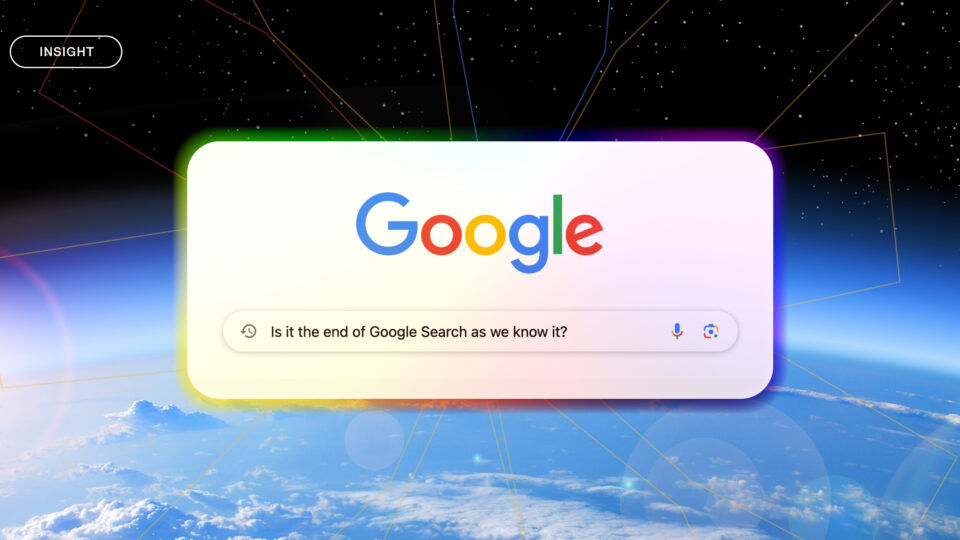
Reading a recent article in Marketing Week by Mark Ritson he makes an interesting observation… Google’s mission way back in 1998 was ‘To organise the world’s information and make it universally accessible and useful’. But what if in this new era of AI, people don’t need the organisation of their information, and don’t want access to it all?
What if, as is typically the case, the human decision-making process is about simplifying things? What if people don’t want all the world’s information organised and accessible anymore? What if they just want the answer not ads and then a list of sites?
Check out our chat below with Head of Digital Strategy, Dave McRobbie, on his views on the future of Google.
The disruptor disrupted
To ‘Google’, or ‘I Googled’ has become part of the modern lexicon, it’s synonymous with most of our daily routines when we start to search for something online, yes Bing has some market share too, but Google is the name we use for online search. It’s promise — of being able to find anything, anytime, anywhere is still true. Yet, this mission is contradictory to the growing sentiment among its users. In our current landscape, we are constantly bombarded with an overpowering amount of content and information. From the one billion websites globally to the petabytes of digital content produced daily, it’s overwhelming.
Generations to come will likely laugh when we tell them stories of how we’d type a query into a box. Then we’d get a long list of ‘search results’ starting with a bunch of paid-for ads, that dominate up to the first four listings, and then lower down you get even more ads, then more on further pages. And it’s pages and pages of information. And how we’d then scroll through those pages for links to websites, that might be relevant to what we are looking for or just well-optimised to appear relevant. They’ll be dumbfounded at the notion of a box, at the archaic art of typing, being presented a long list. Why, well because potentially they’d have just asked for and immediately been given ‘The Answer’.

AI on the Horizon
Google of course isn’t sitting back and ignoring things, its version ‘Gemini’ is trying to compete with the meteoric rise of Open AI, Perplexity or Anthropic, although some recent big own-goals in content creation have certainly not done its reputation for actually being AI-ready, any good.
In the realms of content generation, Gemini’s main issue seems to stem from its attempt to avoid the now common issue where AI picks up on biases and prejudices, for example, people of colour are more likely to need benefits, or CEOs are more likely to be male. It then replays these in its image generation outputs, regardless of the accuracy or hurtfulness of the stereotype.
In contrast to Google’s central search philosophy, AI serves as an invisible curator, capable of predicting our needs before we’re even aware of them. The new currency isn’t the vast library; it’s the prompt, tailored response that AI offers, it thinks for us and it’s quick. But it does depend on what it’s learning from and the information it’s fed.
We were sold on Google as the best search engine 20 years ago and most of us haven’t ventured anywhere else – we might have dabbled with Bing but then went back to the familiar, safety net that is Google. Same with Google Maps. We all just assume these services are world-beating because they work, and who has time to check for anything better really?

Jeff Bezos – a Perplexing move?
Did you know that Jeff Bezos was an early investor in Google? In recent headlines, Jeff Bezos, who to a large part was the backer behind Amazon’s rise, has made a surprising investment in Perplexity, a new player in the AI start-up pack. This move is more than a financial play; it’s a salvo that challenges the very foundations of Google’s ethos. With Bezos already shaking up industries, it begs the question if this is the first domino to fall in Google’s empire.
What is Perplexity and what’s the pitch?
Perplexity’s pitch is it’s the fastest way for you to get information. It sells itself as an alternative to traditional search engines, where you can directly pose your questions and receive concise, accurate answers backed up by a curated set of sources. It has a conversational interface, contextual awareness, and personalisation to learn your interests and preferences over time.
Perplexity’s mission is to make searching for information online feel like you have a knowledgeable assistant guiding you, it is a powerful productivity and knowledge tool that can help you save time and energy with mundane tasks for a multitude of use cases.

How does Perplexity accomplish this?
With the help of an advanced answer engine, it processes questions and tasks. It then uses predictive text capabilities to generate useful responses, choosing the best one from multiple sources, and concisely summarizes the results. You can find out more about that here.
So how do Google and Perplexity compare?
Google Search offers:
- Billions of web pages at your fingertips
- It’s Algorithms: The context to provide you relevant results
- Fast, intuitive browsing, that’s easy to use
- Google Search is critiqued for prioritising SEO-optimised content over quality
- Paid for advertising – Google’s ad revenue is circa 80% of its total revenue
How Perplexity offers:
- AI-Powered Summaries: Direct answers by synthesising web information
- Tailored responses understanding the context of your query
- Adaptive Learning – Improves with interaction, refining its accuracy as it goes
- Source clarity: It provides references for users to verify
- The reliance on AI can lead to variability in answer quality, especially for complex queries or topics that are not as well covered
So what’s the future of search marketing?
For the marketing industry, this seismic shift poses an intriguing challenge. Anticipating change and adapting strategies have always been at the heart of our own evolution. The agency landscape, particularly in Bournemouth and London are hubs for digital innovation, showcases this resilience.
To stay ahead, Fireworx is pivoting to anticipate not only what customers are searching for but also the context and intent behind those searches. Content remains king, but its sovereignty is challenged by the micro-moments that AI anticipates on our behalf.
Accessing the AI Arena
While the landscape is rapidly transforming, digital marketing through Google isn’t obsolescent, it’s undergoing an AI-augmented renovation. The challenge is to harness AI not as a competitor to Google but as a conduit to reach audiences on new terms and new platforms. If your site is optimised well in Google then you’ll have a good chance of being picked up by Chatbots like Perplexity.
Mark Ritson from Marketing Week has written some really good articles on the subject and is well worth checking out if you’ve not already. He postulates that Google’s current trajectory is sustainable until it clashes with the very essence of what consumers now desire, which isn’t a library, but a librarian.
To read more about Mark’s thoughts check out his article. Source: https://www.marketingweek.com/ritson-google-adapt-legacy-technology/
Keeping It Human
In a sea of AI, the human touch becomes the true differentiator. Marketers can integrate technology to assist, but the narrative and emotional resonance are uniquely human elements that machines can’t surpass…. yet. With over 30 years in the industry judgment and taking reassured bets are where we continue to deliver the true value. It’s why we didn’t push our clients down the Meta Verse hype or build a voice assistant app.
The Localisation Algorithm
AI’s strength lies in its comprehension, but the beauty of marketing is often in the details. How can we capitalise on AI’s breadth without sacrificing the depth that organic SEO and targeted PPC campaigns provide? Will Google pivot to charging for AI models?
News in the Guardian is that it might.
They make the argument that ‘Google search prints money and generative AI burns money and so what happens when an unstoppable force hits an immovable object?’
News that the search engine is considering charging users for access to its AI-powered search tools comes as a surprise, in a way. Google generates more than half its total revenue from search, almost five times its next most valuable sector, which encompasses every single thing the company charges directly for other than cloud computing. YouTube subscriptions, Pixel phones, Play Store commissions and Gmail storage combined are a drop in the ocean compared with the value of search alone.
Charging for access to that moneymaker seems like a nonstarter, in other words. For every user who pays, many more would bounce to an alternative, and when the quarterly sum to beat is $48bn – which would require a $24 annual subscription from every human on Earth – the maths just doesn’t add up.’
Disruptive Thinking in Digital Marketing
The challenge for CEOs and marketers alike is both reflective and proactive. We must explore the horizon with the inquisitiveness of a start-up, yet strategise with the composure of those who have seen the fads come and go, only to see marketing waste millions chasing the latest craze based on silver bullets and FOMO.
We doubt it’s the end of Google as a company, after all, they hold data on every company in the world, however, it might well herald the end of Google as a gatekeeper for entry to the digital realm. It’s a call for reinvention, not just for the search engine giant, but for all of us entwined in its ecosystem. Time will tell if chatbots like Perplexity are the catalyst for this transformation. Until then, we must be ready to adapt to the major changes that will happen quicker than it took us to write this blog. The future of digital is a blank search bar awaiting our bold directives.
Google and perplexity are fundamentally different. Google is a search engine displaying listed results, Perplexity is an AI tool that uses search at its core. Google can see the shift in behaviour and will provide options similar to Perplexity and then some. The main challenge for Google not doing this is Ads that stay on top of search, which are its main business profits.
Why not check them out and let us know what you think?



